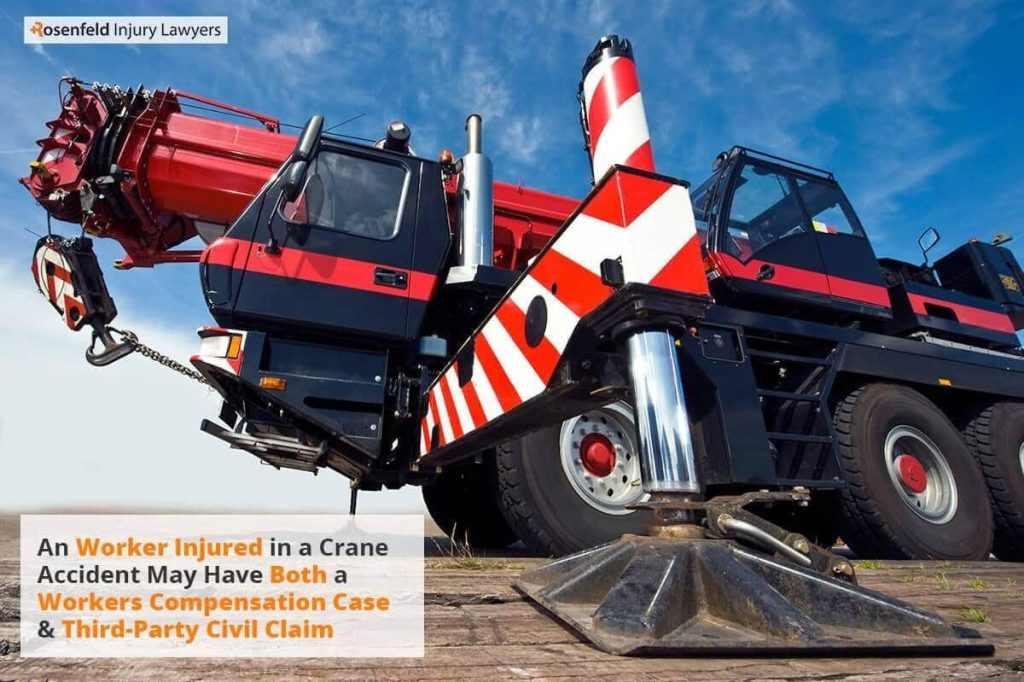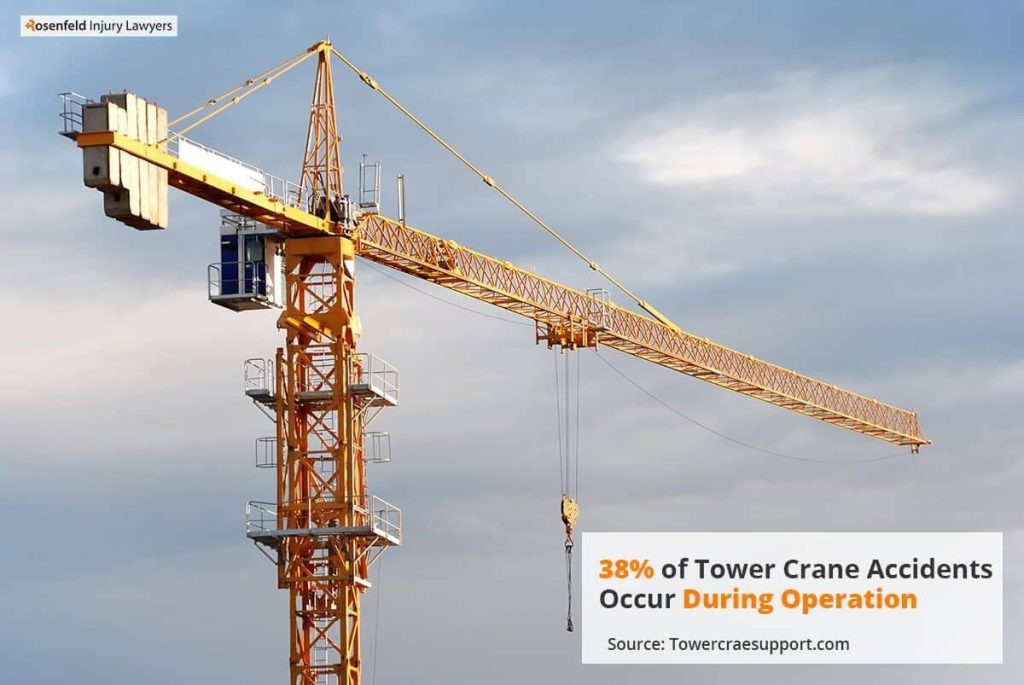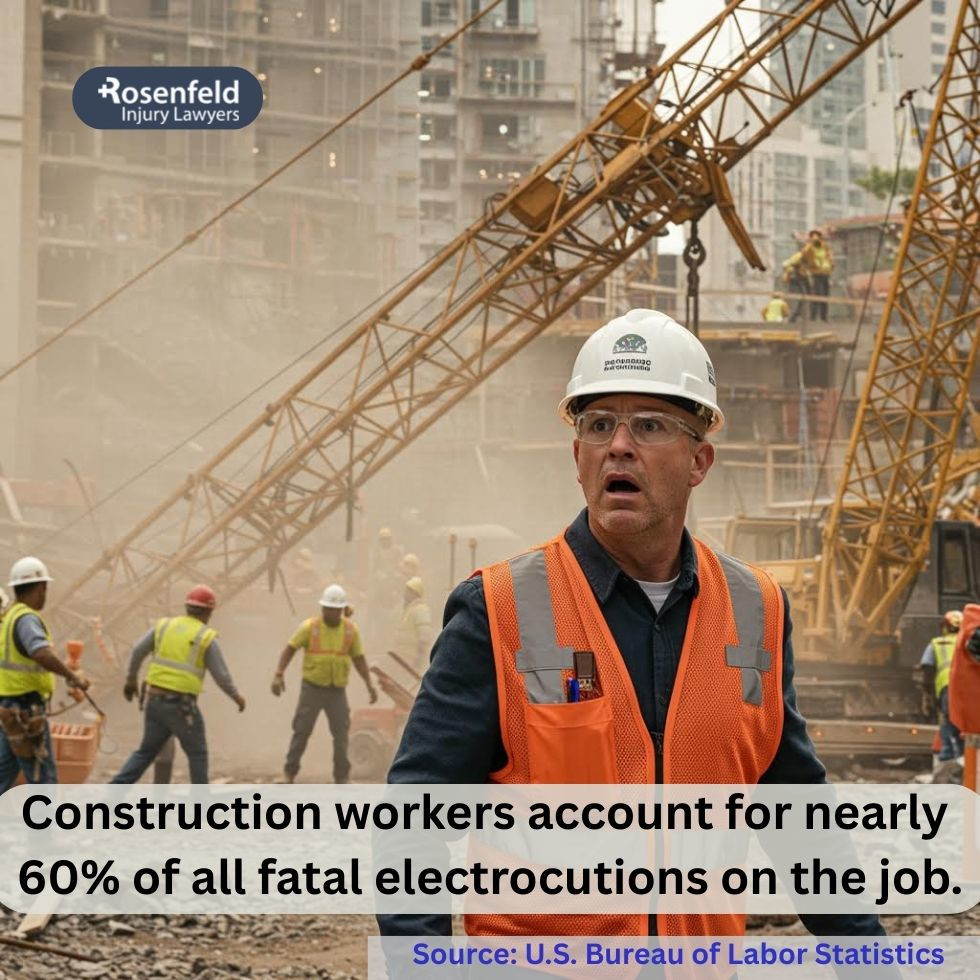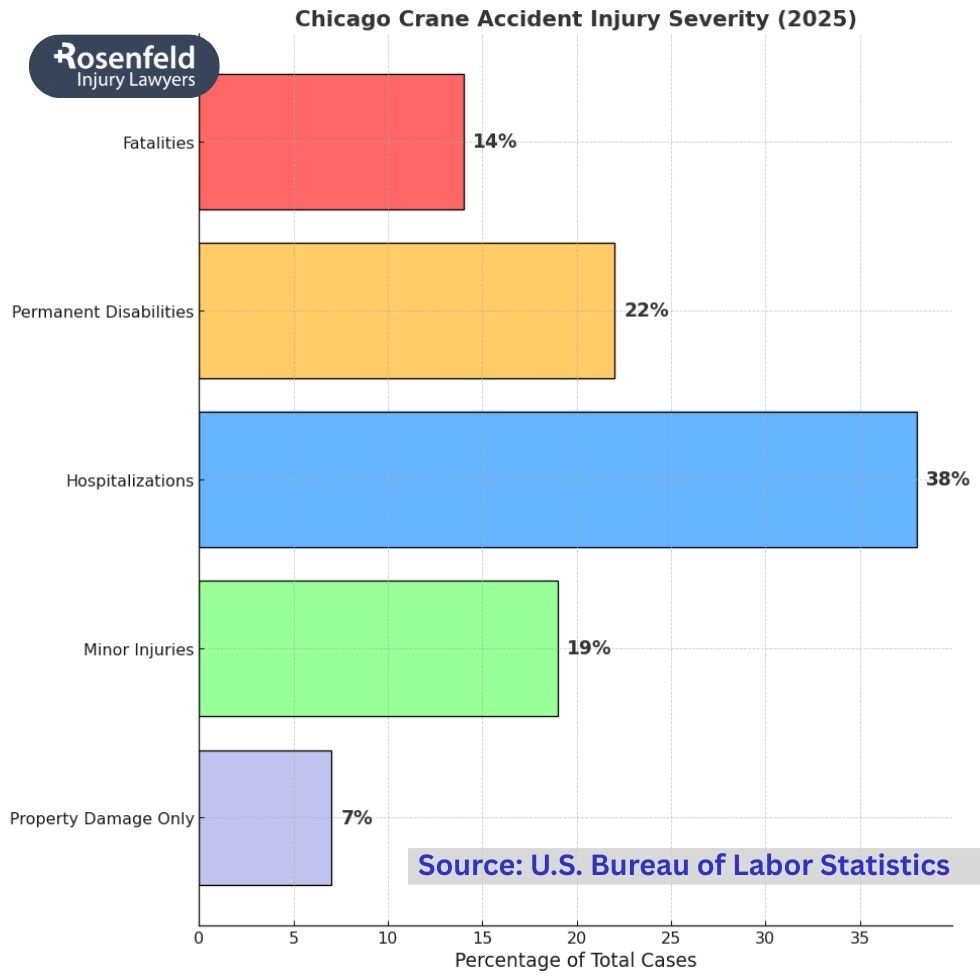Award-Winning Chicago Personal Injury Lawyer - Securing Justice
for Illinois Injury Victims - Over $450 Million Recovered
At Rosenfeld Injury Lawyers, our experienced Chicago crane accident lawyer team understands the devastating impact a serious crane accident can have on workers and their families. These incidents often leave construction workers facing severe injuries, mounting medical bills, and time away from work. While crane-related trauma is unique, the height risks involved often overlap with those handled by a Chicago Aerial Lift Accident Lawyer, a Chicago Scaffolding Accident Lawyer, or a Chicago Roof Fall Accident Lawyer, all of whom focus on fall protection and elevated site safety.
Our Chicago construction accident lawyers represent injured workers, their loved ones, and families who have lost someone in a fatal accident involving cranes across Illinois.
Rosenfeld Injury Lawyers is recognized among the top Chicago crane accident attorneys, with a track record of securing millions for injured construction workers and their families. Our top-rated construction accident attorneys have been honored by Super Lawyers and the Million Dollar Advocates Forum. From investigating equipment failure to reviewing crane safety standards, we build strong cases aimed at helping clients recover maximum compensation.
In one of our cases, James, a Chicago construction worker, suffered severe electrical burns when an aerial lift struck overhead power lines at a downtown job site. Our legal team proved multiple safety violations by the construction company and utility provider, securing a $10,500,000 recovery to cover his medical expenses, lost wages, and lifelong care.
Accidents involving cranes on Chicago construction sites often stem from preventable errors and safety violations. One of the leading causes is inadequate operator training or certification, which can lead to serious mistakes during crane operations.
Mechanical failure or improper assembly and maintenance also pose significant risks, as worn or defective parts can trigger sudden collapses or dropped loads. Many incidents occur when OSHA (Occupational Safety and Health Administration) crane safety standards are ignored, such as skipping proper load calculations or failing to secure rigging.
Without a designated signal person or spotter, operators may lack the guidance needed to avoid hazards. Uneven ground and dangerous weather conditions, like high winds, can further destabilize cranes. Communication breakdowns between the crane operator and ground crew frequently contribute to serious injury or fatal accidents. Unstable surfaces also present critical dangers for other trades; for instance, a Chicago Excavation Accident Lawyer addresses soil collapses in trenches, while a Chicago Ladder Accident Lawyer focuses on the positioning failures that lead to falls on smaller-scale projects.
The most common crane accident injuries involve catastrophic injuries and fatalities. Traumatic brain injuries often result from falling objects or crane collapses, leaving victims with lasting cognitive and physical impairments. Spinal cord injuries, including paralysis, are common in falls or crushing incidents.
Some injured workers suffer amputations from entanglement in moving parts or being pinned under loads. Severe burns can occur when cranes contact overhead power lines. Multiple fractures and orthopedic injuries are frequent in falls from heights, while internal organ damage from blunt force trauma can be deadly.
An injured construction employee in Illinois may be entitled to workers’ comp benefits through their employer’s insurance. This can include full coverage of medical bills, temporary total disability (TTD) payments while recovering, vocational rehabilitation if the worker cannot return to the same job, and permanent disability benefits for lasting impairments.
If a crane accident results in fatality, surviving family members can obtain death benefits, including funeral expenses and a portion of the worker’s lost income.
When a crane accident is caused by negligent parties other than the employer, such as a construction company subcontractor, equipment manufacturer, or property owner, the victim can pursue a personal injury lawsuit.
These personal injury claims may seek damages for pain and suffering, loss of normal life, permanent disfigurement, and loss of consortium in wrongful death cases. Punitive damages may also be awarded to punish reckless conduct.

Based on Law.com‘s VerdictSearch, payouts for a Chicago crane accident range from $7,594 to more than $95 million, with an average of $10,806,327 and a median of $2,606,116. The value of a crane accident personal injury case is influenced by factors such as:
$20.9M Jury Verdict for Ironworker Severely Injured by Falling Steel Beam
35-year-old ironworker Rick Blaisdell lost much of the use of his left arm, suffered a traumatic brain injury, and internal injuries when a crane’s load struck a steel column, causing a beam to fall on him. The general contractor, Frederick Quinn Corp., was found liable for unsafe crane operations and site management. After multiple surgeries and permanent disability, Blaisdell received a $20,937,743 jury award, in addition to pretrial settlements totaling over $2 million.
$13M Settlement for Laborer Struck by Falling Load from Crane in Chicago
Adan Carriedo, 39, suffered skull and pelvic fractures, abdominal injuries, and partial finger amputation when unsecured materials fell from a stacked crane load at a State Street condominium project. He could not return to work as a laborer. Alleging unsafe work practices and poor supervision, Carriedo settled with the general contractor and subcontractor for $13 million, covering both his claim and his wife’s loss of consortium case.
$6.76M Settlement for Construction Worker with Facial Fractures and Brain Injury
Catherine Graves, 35, was injured on a Chicago road project when a crane’s 1,000-pound sheet metal load struck a plank she was holding, propelling it into her face. She suffered facial fractures, a traumatic brain injury, memory loss, and ongoing symptoms. Alleging liability under the now-repealed Structural Work Act, Graves settled for $5,899,000, with an additional $860,000 workers’ compensation lien waived, bringing the total to $6,759,000.

A serious Chicago crane accident can leave an injured construction worker facing more than just medical bills and lost wages. It often means taking legal action against multiple defendants. Liability may extend to an employer, the general contractor, the crane rental company, or even the manufacturer of defective equipment. This complexity is also present in a Run-Over Construction Equipment Accident, where heavy machinery blind spots and inadequate spotting protocols lead to tragic results that require specialized legal investigation.
Proving fault requires a legal team with experience in OSHA investigations, accident reconstruction, and identifying negligent parties. An experienced attorney can coordinate these efforts, protect your rights throughout the legal process, and work to secure fair compensation for the injuries sustained, whether through a personal injury lawsuit or a workers’ comp claim.
From 2011 to 2017, the Census of Fatal Occupational Injuries (CFOI) recorded 297 crane-related deaths nationwide—an average of forty-two per year.
More than half of these deaths involved a worker being struck by an object or equipment, with most cases caused by objects falling from or being moved by a crane. Falls from height and transportation incidents each accounted for over ten percent of fatalities.
In 2024 alone, OSHA records show five separate crane accidents in Chicago, each resulting in fatal injuries.
In Chicago, many crane accidents occur on high-rise construction projects in the Loop, large residential builds in River North and the West Loop, and infrastructure projects overseen by the Chicago Department of Transportation. Industrial zones on the South and West Sides—home to manufacturing plants, warehouses, and rail facilities—also see a high volume of crane operations.
Work near the Chicago River, Navy Pier, and major transit hubs often involves tower crane accidents and other incidents due to the scale and complexity of the projects. Each of these environments carries heightened risks without strict adherence to crane safety standards.
Illinois’ Comparative Negligence Law (735 ILCS 5/2-1116) allows injured parties to recover damages even if they are partially at fault for a Chicago crane accident, as long as they are less than 51% responsible. Compensation is reduced in proportion to the percentage of fault assigned.
If a crane accident occurs on property owned by another party—such as a construction site, industrial yard, or commercial building—the Illinois Premises Liability Act (740 ILCS 130/) holds property owners and occupiers responsible for unsafe conditions that cause injuries to lawful visitors.
If a crane accident leads to fatal injuries, the Wrongful Death Act (740 ILCS 180/) allows surviving family members to recover compensation for loss of financial support, loss of companionship, emotional suffering, and grief caused by the death of a loved one.
Under Illinois’ Product Liability Law (735 ILCS 5/2-21), if defective cranes, rigging systems, or mechanical parts contribute to an accident, the manufacturer, distributor, or seller can be held liable. Victims do not need to prove negligence, only that the product was defective and unreasonably dangerous when it left the defendant’s control.
Under the Workers’ Compensation Act (820 ILCS 305), employees injured in workplace accidents involving cranes may be entitled to benefits, without needing to prove employer negligence.
The Illinois Joint Tortfeasor Contribution Act (740 ILCS 100/) is particularly useful in construction accident cases where multiple negligent parties are involved, allowing damages to be split according to each party’s percentage of fault.
The Occupational Safety and Health Administration (OSHA) sets strict rules for crane operation to reduce the risk of serious accidents on construction sites. Key requirements include:
Violations of these regulations can be strong evidence of negligence in a Chicago crane accident case.
Under 735 ILCS 5/13-202, you generally have two years from the date of a crane accident to file a personal injury lawsuit. Missing the Illinois personal injury statute of limitations can result in losing the right to seek compensation in court.
For work-related crane injuries, the Illinois workers’ compensation statute of limitations you have three years from the date of the accident or two years from the last payment of workers’ compensation benefits—whichever is later—to file a claim with the Illinois Workers’ Compensation Commission.
If a crane accident results in fatality, the decedent’s personal representative must file a wrongful death lawsuit within two years of the date of death under the Illinois wrongful death statute of limitations.
Liability for a crane accident in Chicago can involve several parties, depending on how the incident occurred. The crane operator’s employer may be responsible for unsafe operations or inadequate training. A general contractor or construction manager could be liable for poor site supervision.
If the crane was rented, the leasing company may share fault for improper maintenance. Defective design or manufacturing can make the crane manufacturer accountable. Third-party rigging subcontractors and property owners may also face claims for unsafe conditions.

In Chicago crane injury cases, defendants may claim the victim was outside the authorized work area, that operator mistakes were unrelated to employer negligence, or that the injured worker failed to wear personal protective equipment. They may also use comparative fault arguments to reduce payout.
We address these defenses by gathering detailed witness statements that confirm the victim’s location and actions, securing OSHA investigation records that document safety violations, and referencing crane operation safety manuals to show accepted industry standards. These tools allow us to link the accident to negligent practices and hold the responsible parties fully accountable.
To strengthen your crane accident case, report the incident to your employer as soon as possible to create an official record. Seek medical attention right away and keep copies of all treatment records and bills. Photograph or video the crane, the accident site, and your injuries before conditions change.
Collect contact details from any witnesses who saw the incident. If equipment malfunction played a role, preserve the defective parts or rigging so experts can inspect them later. This evidence can be critical in proving liability and securing compensation.
Our Chicago crane accident lawyers guide injured workers through every stage of their case. We handle workers’ compensation claims and appeals to secure benefits for medical care, lost wages, and permanent disability. When negligence by a third party is involved, we file lawsuits against responsible companies or individuals. Our firm’s commitment to safety extends to all types of tool and machinery failures, providing expert counsel through a Chicago Nail Gun Accident Lawyer, a Chicago Punch Press Injury Lawyer, or a Chicago Table Saw Injury Lawyer when equipment defects cause harm.
Our team works closely with OSHA investigators and engineering experts to identify safety violations and equipment failures. We negotiate aggressively with insurance companies to reach fair settlements, but are always prepared to take your case to trial if needed. Every step is focused on maximizing your financial recovery.

Can I sue if I was hurt by a crane on a job site?
Yes. If your injury was caused by a third party—such as a crane rental company, general contractor, or manufacturer—you may file a personal injury lawsuit.
Can I file a workers’ compensation claim and a personal injury lawsuit?
Yes. Workers’ compensation covers medical bills and lost wages from your employer, while a personal injury lawsuit can pursue additional damages from negligent third parties involved in the crane accident.
Who can file wrongful death claims after a fatal crane accident?
Under Illinois law, the deceased worker’s personal representative may file. Damages are distributed to surviving spouses and next of kin, which can include children, parents, or other dependents, based on their relationship and level of financial dependency.
How long do crane injury cases take to settle?
Settlement timelines vary. Straightforward workers’ compensation claims may resolve in months, while complex third-party lawsuits, especially those involving multiple defendants, can take one to three years or longer, depending on liability disputes and medical recovery progress.
How much does a Chicago crane accident attorney cost?
Our law firm works on a contingency fee basis, meaning you pay nothing upfront. We are paid a percentage of the recovery only if your case is successful, so there’s no out-of-pocket cost to start.

If you or a loved one has been injured in a crane accident, Rosenfeld Injury Lawyers is here to help. Our Chicago-based personal injury lawyers provide legal counsel to clients throughout Illinois. Whether you’re pursuing workers’ compensation, a third-party lawsuit, or a wrongful death claim, we’re ready to fight for the maximum compensation you deserve.
Call us at (888) 424–5757 or fill out our contact form to schedule a free consultation.
All content undergoes thorough legal review by experienced attorneys, including Jonathan Rosenfeld. With 25 years of experience in personal injury law and over 100 years of combined legal expertise within our team, we ensure that every article is legally accurate, compliant, and reflects current legal standards.